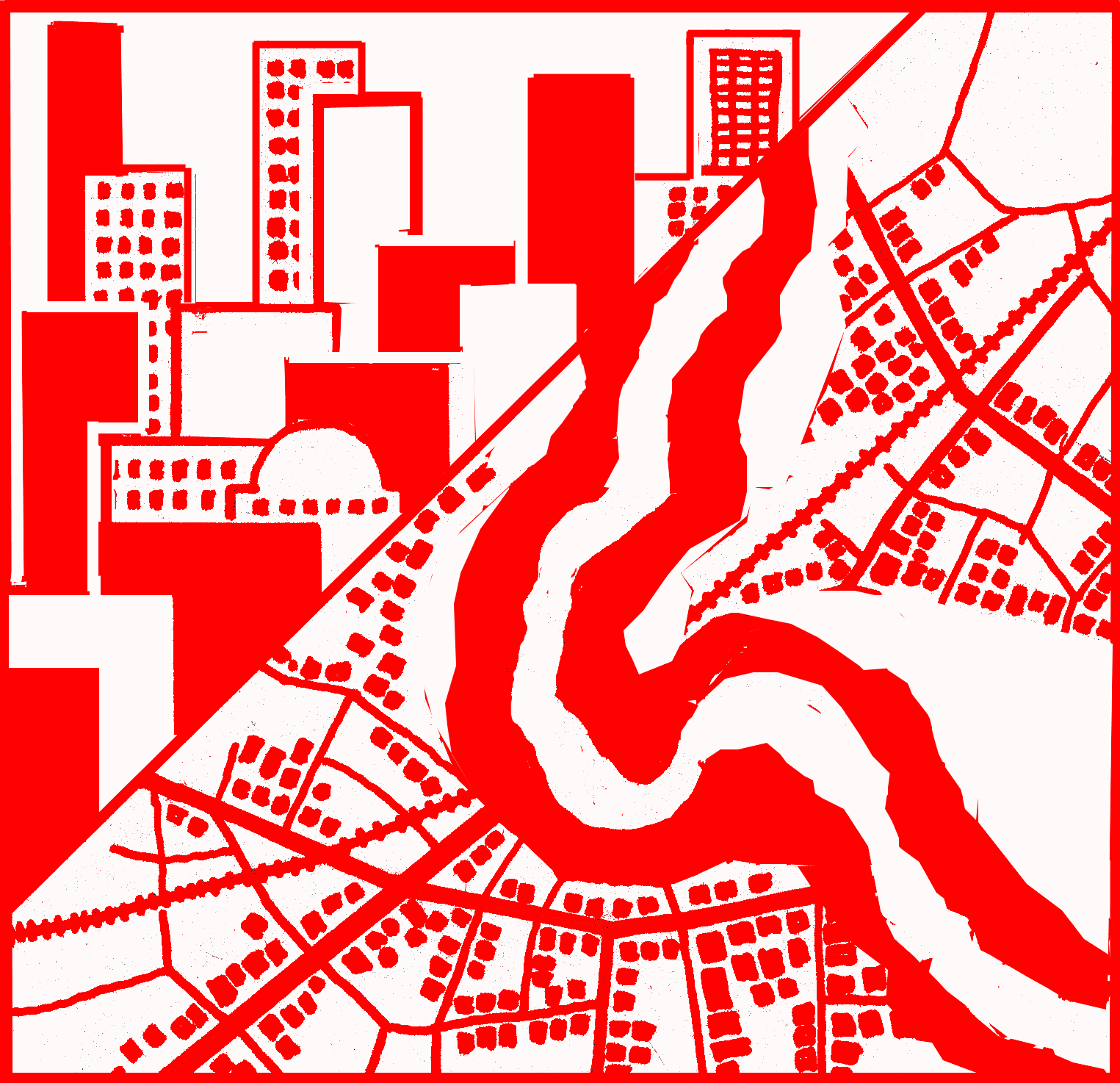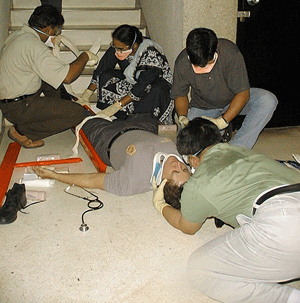| Editor's Corner...
Book Review...
ADPC Regional Programs...
Training and Education...
From Latin America...

Theme

Insight...

AUDMP - making cities safer

From the grassroots

duryog nivaran

Bookmarks

WWW Sites
|

|
ADPC regional programs...
| Regional Workshop on Damage Assessment and Needs Analysis
From 24-28 April 2000, ADPC hosted a regional workshop in Bangkok with experienced disaster managers from selected countries and international relief and aid organizations. The workshop enabled participants to share current methodologies and synthesize best practices. It began with a case study presentation on the 1999 earthquakes in Turkey, graphically illustrating the sometimes conflicting reports published on the Internet after a disaster by formal sources such as UN-OCHA, news agencies, and other less official sources. It was demonstrated that governments need to publish their own official reports if situations are to be presented fairly and accurately.
The workshop methodology took participant working groups through exercises which posed decision-making problems in reporting formats. There was lively debate about the importance of detailed reporting of a disaster's effects, a more complicated problem than it seemed at first sight. The workshop's concluding plenary session reviewed working group outputs. Most participants felt they had learned how to improve response management in their countries or organizations, but they are not necessarily in positions to make changes in their national systems. They felt the need for international organizations to support them by lobbying policy-makers. There was agreement that:
There is general understanding of DANA's importance and the need to improve processes, especially for defining needs;
The purpose of reports is to provide organized information to facilitate recipient decision-making;
Information is needed at all administrative levels, but requirements may differ by level;
Formats should be simple and should guide the reporter through the sequence of stating the problem, identifying current response status and unmet needs, and decision-making;
Report formats should be determined by recipients so that information is presented in a way that is most helpful to those who have to act upon it;
Reports should balance narrative with tables;
More guidance is needed on how data are collected, analyzed and presented;
There is scope for improvement and standardization of yardsticks, indicators, planning factors and formulae;
Although it may not be possible to agree internationally-acceptable reporting protocols for all levels, standardized national reporting processes are crucial.
|
ADPC-DIPECHO partnership in Southeast Asia
ADPC will soon begin to implement a new regional program under the Second Plan of Action for Southeast Asia of the Disaster Preparedness Program of the European Community Humanitarian Office (DIPECHO). This regional program will have four distinct but inter-related components:
development of a regional information exchange and networking mechanism;
strengthening of networking and information sharing among national disaster management coordinating bodies of countries in Southeast Asia covered by DIPECHO's Second Action Plan;
review and updating of disaster management training materials; and
capacity building among DIPECHO partners on community-based approaches to disaster management.
Enhancing Hospital Disaster Preparedness (HosDiP)
In earthquake prone areas in Asia, are the hospitals structurally sound? Do they have operational plans in cases of earthquake disaster, and in cases of hospital collapse? Can the medical doctors in those hospitals and clinics who in normal times treat patients on an individual basis, treat the earthquake-injured people "en masse"?
These are some of the issues related to disaster preparedness of hospitals in earthquake-prone areas. ADPC's ongoing Program for Enhancement of Emergency Response (PEER), supported by theUnited States Office of Foreign Disaster Assistance (US-OFDA), is going to include a Hospital Disaster Preparedness (HosDiP) component to address some of these issues in the target countries of India, Indonesia, Nepal and the Philippines. A program design workshop will take place on 27-28 July 2000 at ADPC. The workshop will be attended by respresntatives from PEER partner agencies in India, Indonesia, Nepal and the Philippines, ADPC program staff, experts from OFDA and experts from the Centers for Disease Control and Johns Hopkins University, Dr. Eric Noji and Prof. Nick James respective
| Extreme Climate Events (ECE) Program in Vietnam
ADPC, in collaboration with NOAA and with support from USAID's Office of Foreign Disaster Assistance, has undertaken a project on understanding extreme climate events such as El Ni–o in Indonesia, the Philippines and Vietnam. In Vietnam, the project was implemented by the Disaster Management Center of the Ministry of Agriculture and Rural Development (MARD). The Start-up Workshop was held on 29-30 April 1999, following which a quick assessment study was undertaken on El Nino Southern Oscillation (ENSO) climate forecast applications in Vietnam. The assessment was carried out by experts from the Hydrometeorological Services, the Agrometeorological Research Center, the Drainage and Iirrigation System operation management of MARD, and the Disaster Management Center. A report based on the experts' inputs constituted the background paper for the National Consultation Workshop held on 15-16 May 2000.
The workshop objectives were to share results of the quick assessment study, present potential applications of ENSO forecast information, and prepare an action plan for managing the impacts of future ENSO events in Vietnam. Thirty-five participants from the climate forecasting and application sector and international organizations discussed ENSO impacts on Vietnam and identified opportunities for mitigation applications of climate forecasts.
The initiative successfully brought together the climate science community and various users and potential users of climate information. To begin institutionalizing this process, a Climate Forecast Producers and Users Workshop will be held in September 2000 immediately on receipt of a wet season forecast. Another workshop will be held in March 2001 to evaluate the experiences of the September 2000 forecast and application, and to use the dry season forecast for resource management. Based on the experiences of the two workshops, a workplan will be formulated to further institutionalize climate forecast and application systems in Vietnam.
|
Program for Enhancement of Emergency Response (PEER) Update
The PEER program aims to improve the search and rescue capacity and performance of emergency first responders, to conduct, effectively assess, treat and transport disaster victims, and to plan for, undertake and manage effective search and rescue operations.
A two-week regional training course for Medical First Responders (MFR) was successfully conducted in April 2000 with 24 participants from the four partner countries of Indonesia, the Philippines, India and Nepal. PEER received technical support from Miami Dade Fire Rescue Department which provided eight instructors to organize this interactive and performance-based course. To pass the minimum performance standard, participants had to take four skills assessment stations and written tests. Yet, it was necessary at national level to identify needs and adapt the curriculum to meet local protocol in each country. A workshop on MFR materials adaptation will be conducted by the end of 2000.
 |
|
On 18-23 June 2000 PEER collaborated with the National Disaster Coordinating Council, Department of National Defense, Philippines, to conduct a one-week Training for Instructors (TFI) course in Manila. There were 30 participants from government and non-government organizations. The TFI course aimed to enhance the communication and training skills of the selected participants to take the lead in initiating and conducting PEER training activities.
During 2-14 July 2000 PEER again collaborated with the National Disaster Coordinating Council to conduct a two-week sub-regional MFR training course in Manila, with 24 participants from Indonesia and the Philippines. Instructors from Miami Dade Fire Rescue Department were present at the training along with six MFR graduates as assistant instructors. |
|



![]() To get announcements whenever this page is updated, please subscribe to adpc-announce-subscribe@egroups.com
by sending a blank email.
To get announcements whenever this page is updated, please subscribe to adpc-announce-subscribe@egroups.com
by sending a blank email.